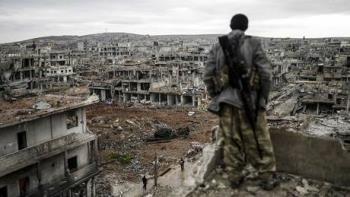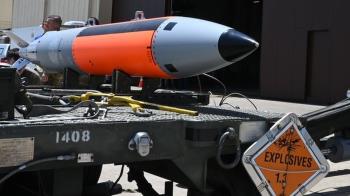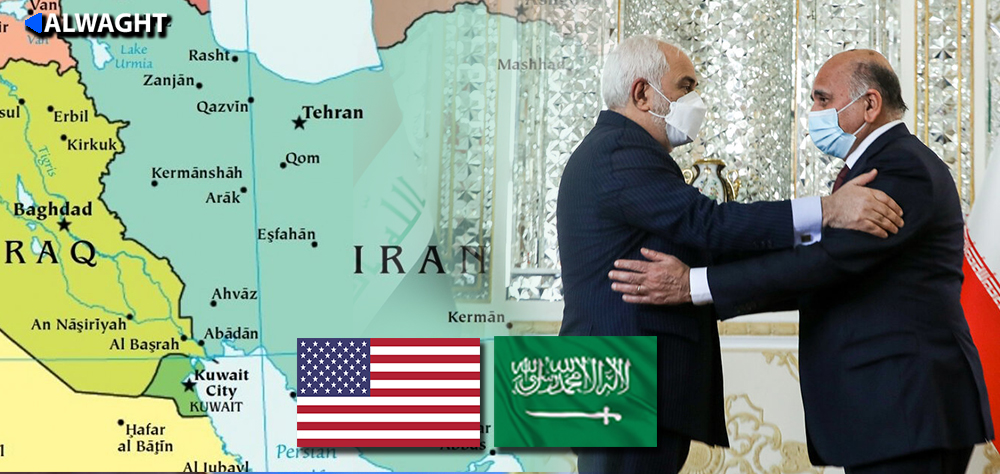Alwaght- Iraqi Foreign Minister Fuad Hussein arrived in Tehran on Saturday for a second official visit in a month. The goals of the visit are now the focus of the international and regional media.
Boosting bilateral relations
Strengthening bilateral cooperation between Iran and Iraq as two friendly and neighboring countries was the most important goal of the visit of Iraqi FM. Hussein met with his Iranian counterpart Mohammad Javad Zarif and announced Baghdad's readiness to develop relations with Iran at all levels. Here are the areas where the two countries can shore up their cooperation.
- Increasing trade and economic cooperation between Tehran and Baghdad, as in the past few years, was the most important focus of the Iraqi FM's trip to Iran. In recent years, the Islamic Republic increased the level of exports to Iraq to about $20 billion, and both countries seem to be interested in such a high trade volume.
- Increasing bilateral security cooperation was another dimension that has always been a common concern between Iran and Iraq over the past few years. Fighting ISIS inside Iraq and countering the activities of terrorist groups on the common borders were among the most important issues always raised by the two sides. In the new conditions, Iran can raise its concerns about the security and political equations in Iraq. The Saudis are going to great lengths to sign security agreements with Baghdad to prepare the ground for their destabilizing interventions and separate Iraq from the Iran-led Axis of Resistance.
- Another case of discussion between the two sides was the payment of the Iraqi debts to Iran. During meeting with Iran's National Security Council chief Ali Shamkhani, Hussein commented on the debts to Iran whose payment is delayed by the US sanctions.
"With the continuous efforts of the financial and banking sectors and the economic institutions of Iran and Iraq, some important obstacles have been removed and the debt repayment process will begin soon, based on the model agreed between the two countries," he said during talks with Ali Shamkhani.
In his talks with Zarif, Hussein pointed to the developments made in this regard, promising that Iraq will do what it takes to facilitate Iran's access to its financial resources in Iraq.
Seeking mediation between Iran and Saudi Arabia?
One of the serious assumptions about Hussein's visit to Iran can revolve around the possibility of mediating or sending a Saudi message to Iran. He paid an official visit to Riyadh late last week and visited Iran less than a week later, promoting speculation about mediatory purpose of the PM's visit.
As a confirmation to this assumption, we can point to the Iraqi foreign ministry’s statement. Ahmad al-Sahaf, the foreign ministry's spokesman said that the visit comes as part of a policy followed by Baghdad seeking regional balance. Riyadh and Tehran have grounds for dialogue for an array of regional cases, especially the Yemeni crisis, caused by war waged against Yemen by the Saudi kingdom in 2015 to undo gains of a popular revolution that toppled in late 2014 government of President Abdrabbuh Mansour Hadi.
In recent weeks, Ansarullah revolutionary movement made game-changing progress against the Saudi forces and their mercenaries in Ma’rib, a strategic province and the last stronghold of Riyadh-led camp in the north. With their camp devoid of power to resist the push, the Saudis are trying to, via Baghdad, utilize Tehran’s sway in Yemen to halt the advancement, a hope highly unlikely to materialize.
Carrying US message?
Hussein's second visit to Iran in less than a month and following US President Joe Biden's order for an attack on resistant forces in Syria's Abu Kamal border region, prompted speculations that Iraqi top Diplomat was carrying US government message for Iran. Odds are the Americans, amid Iraqi public and political outrage about the Friday night airstrikes on Iraq's Popular Mobilization Forces (PMF) who are stationed on the Iraqi-Syrian border to guard against ISIS terrorist re-emergence, seek to calm the heightening anti-American rage using the Iraqi foreign ministry.



























